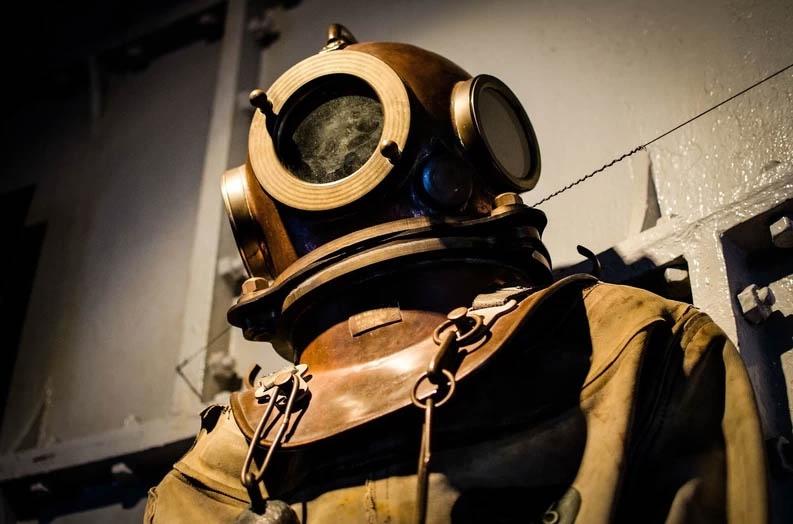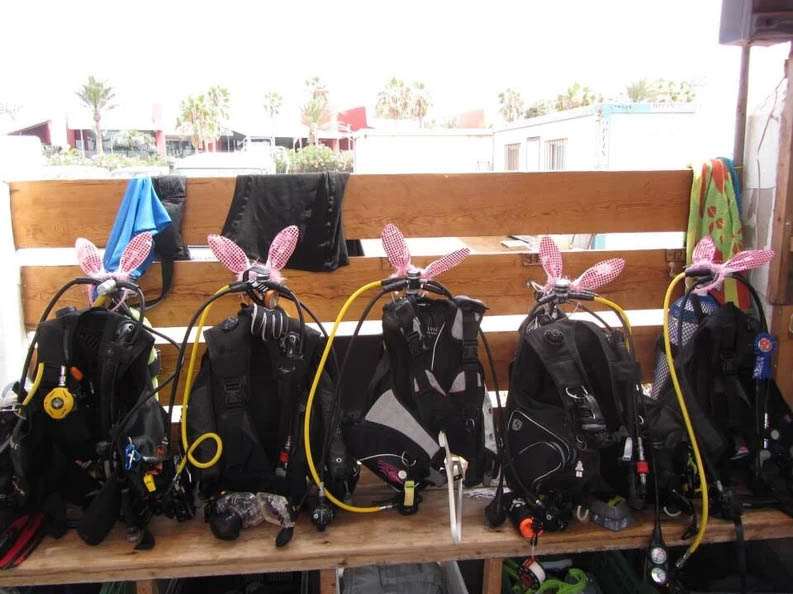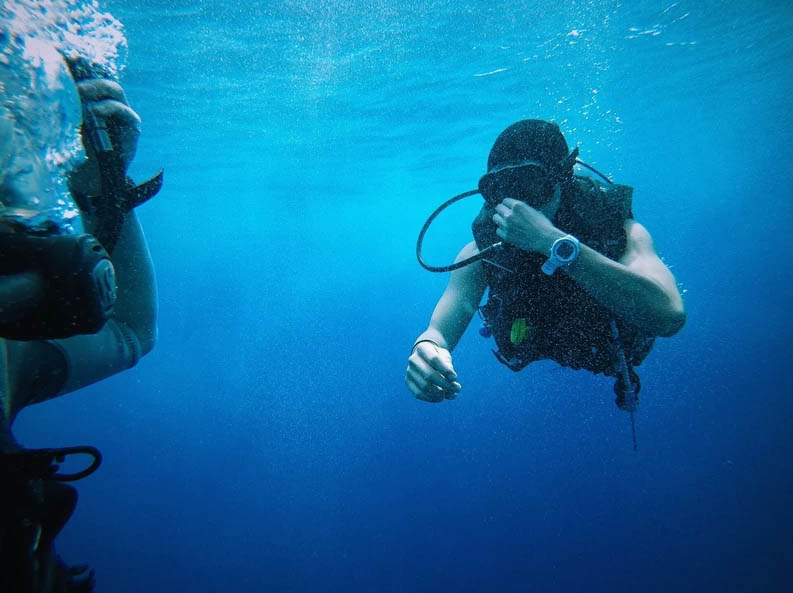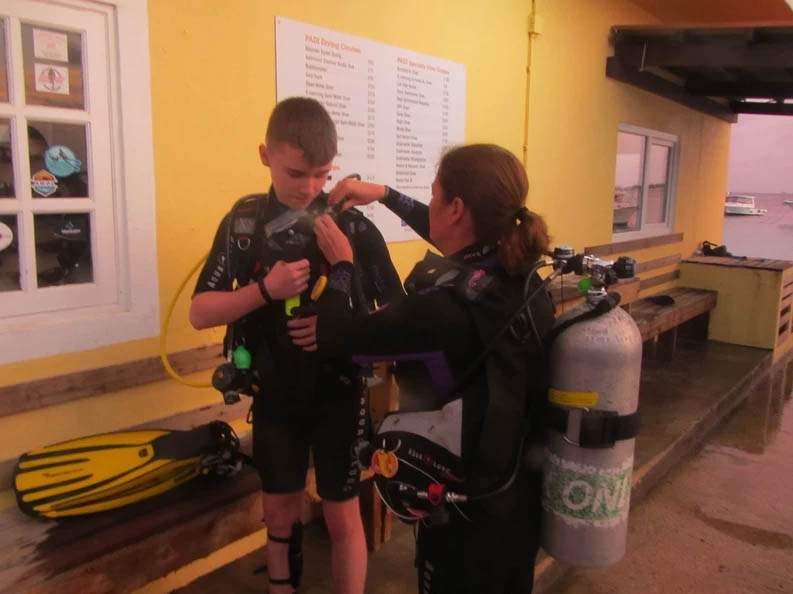As your scuba diving develops so does your haul of equipment – most of it necessary, some of it less so – Phil, for example, has 4 BCDs for reasons that we can’t quite fathom and, despite his best efforts, he can’t quite justify.
Renting diving equipment is something that is a necessity for all of us at some stage. Whether it’s full equipment rental when we first start out or the occasional hire when luggage restrictions prevent us taking everything we need.
Even when you eventually own everything and are able to get it to your dive destination, you are still likely to want hire tanks and weights at the very least.
It’s also a great fallback if you lose something or forget to pack it in the first place (we have a scuba diving holiday packing list to help with that!).
Another big consideration is when you are scuba diving with children. Most of us won’t want to buy them things like wetsuits, fins and BCDs until they stop growing.
Or at least until the little darlings can pay for it themselves.
In reality most families will have a mix of owned and rental gear at any one time.
But is it safe? Can you trust the scuba diving equipment that you rent from a dive centre or boat? Is it correctly maintained and serviced?
And what if you find a fault?
Put simply – yes it is
If nothing else you should take that message away from reading this blog – you can trust the scuba diving equipment that you hire.
There are always exceptions and if you go digging you will undoubtedly find some horror stories. The vast, vast majority of dive centres however, have a meticulous approach to safety and indeed excellent safety records.
This includes the equipment that they rent to guests. If you don’t feel you can trust the equipment that you are hiring from a dive centre then we would ask why on earth are you diving with them in the first place?
It is not just a professional and ethical consideration, it’s a commercial one. No dive operator could ever risk getting a reputation for poor safety, regardless of the potential regulatory and legal ramifications.
A quick straw poll of those of us in the Dive Bunnies office today revealed knowledge of 2 minor issues across a combined 42 years’ of diving.
All equipment must be regularly serviced and dive centres schedule annual maintenance and checks during their low season when they can take items out of the rental stock with minimal commercial impact.
In addition, rental equipment is not left in a suitcase or garage for weeks or months on end between dives – it is used almost constantly so any minor issues that do arise are invariably spotted and fixed immediately.
If it can’t be fixed due to a qualified technician not being available or parts needing to be ordered, then the item will be placed in quarantine.
Another serious consideration is that dive centres simply cannot afford to be constantly replacing their rental stock. They need and want it to be properly maintained and looked after to maximise its useful life.
What’s more – with rental equipment you always get a double check; first from the divemaster or instructor who is checking the kit out and then from you yourself as a certified diver.
And if you do spot an issue with an item of rented scuba diving equipment? Just tell a member of the dive crew, they’ll either fix it or swap it out in a matter of moments.
How good is hire equipment?
The equipment that you can rent from any scuba diving centre will be safe and perfectly suited to the local environment in which they are operating.
Whenever we are asked by someone what thickness of wetsuit they should buy, we always have to ask where they are planning on diving. If you are renting your wetsuit then that issue is generally removed.
You should not, however, expect rental gear to be the latest or best models on the market.
Similar to rental cars, rented diving equipment doesn’t receive the same level of love, care and attention from its users as privately owned gear does. The dive centre may look after it perfectly well, their guests, less so.
You also will generally not find any of the ‘nice to haves’ like thermal rash vests, socks, knives or a computer that isn’t encumbered with someone else’s previous dive.
You also have to consider that if a scuba dive centre was to allow you to rent all of the latest equipment then they’d never sell anything.
So the equipment available for rent will be safe and it will be suitable for the local conditions – but it won’t be the best on the market… you’ll find that in the shop.
So all good then – hire and forget?
Another simple answer…no.
The moment you sign out the equipment it becomes YOUR diving equipment for YOUR dive. As we wrote about in our blog ‘No – the dive guide is NOT responsible for your dive!’ you must not abdicate responsibility for your dive (or equipment) to anyone else once you are certified.
You are responsible for deciding if the equipment is safe for you to use and you decide whether or not to scuba dive with it.
You must check your equipment in exactly the same way as you would if it was your very own.
- Does the BCD hold its air?
- Do all the dump valves work?
- Are the wetsuit/drysuit seams and seals in good order?
- Is everything a good fit?
- Is the weight belt buckle clean and firm?
Never be reluctant to ask questions around servicing and maintenance and always consider dropping into the pool or confined water to check the equipment first – as you would with any new diving equipment.
Most importantly always remember the mantra:
“if there is any doubt then there is no doubt. You haven’t bought it so swap it out!”












1 Comment
I was hoping to find a comparison of different dive destinations – I had to skip one dive in Cozumel because they gave me a leaky regulator and didn’t have a spare. So no, they won’t fix it or swap it out in moments. Someone should do statistics on worst dive destinations for unsafe equipment.